Monday, 27 April 2009
Myanmars murderous myopia
John R. Thomson
One of the wealthier countries in Southeast Asia, Myanmar (formerly Burma), squanders funds on showpiece projects chosen by its reigning military junta, in power since 1962.
The latest example of not investing in beneficial projects was last May, when Cyclone Nargis impoverished 2.5 million Myanmar people, left 1 million homeless and 130,000 dead. The disaster received virtually no attention for a month from a government bent on denying the cyclone's gravity and refusing outside emergency aid.
Myanmar's legal balance of trade exceeds $3 billion annually from natural gas, teak, gemstones and jade - plus uncalculated major illegal revenue from methamphetamine and opium/heroin. Regime spending priorities include buying about $2.5 billion in arms from neighboring China and building a new capital, Naypyidaw, 250 miles north of Yangon (Rangoon), at a cost of $4 billion.
Nonexistent funding for legitimate projects contrasts with egregious personal spending for maximum leader Gen. Than Shwe, who hosted a lavish wedding for his daughter Thandar that netted an estimated $50 million in gifts.
Meanwhile, the United Nations, the World Health Organization and the Asian Development Bank estimate just 10 percent of the country's 50 million to 55 million citizens are literate. The United Nations and WHO peg Myanmar government medical expenditures at 37 cents per capita, unimaginable in a relatively wealthy country. Recovery and rebuilding from Cyclone Nargis proceed slowly, with international aid groups struggling to act efficiently and donor governments loath to provide funds to an uninterested, corrupt regime.
Perhaps most appalling is the government's inattention to Myanmar's HIV/AIDS epidemic. International health experts estimate 250,000 to 500,000 Myanmar are infected, with 75,000 to 125,000 able to lead normal lifestyles and survive 15 to 20 years if treated with anti-retroviral medications. Neighboring China, with a population of 1.2 billion, has about 700,000 HIV-positive or AIDS-diagnosed citizens and is actively combating the disease.
The Yangon-based journal Weekly Eleven News has reported Health Ministry statistics indicating a 15 percent HIV-positive rate among sex workers.
Just 16,000 Myanmar receive treatment, about 12,000 by a Medecins Sans Frontieres-Holland (MSF-H) program and 2,500 by other nongovernmental organizations (NGOs). The government cares for just 1,800 infected patients and does not cooperate with NGOs.
In 2008, at least two Buddhist monasteries were harassed and one was closed for providing care to HIV/AIDS sufferers, with more than 100 caregivers jailed or forced into exile.
Exile-published Irrawaddy magazine recently quoted Health Minister Dr. Kyaw Myint (Gen. Than Shwe's personal physician): "Some big countries accuse the country of not giving effective treatment to infected patients and lacking funds for fighting the disease. ... Myanmar set aside [$180,000] to combat ... the disease in 2007."
The United Nations and WHO estimate current expenditures at $200,000, while 77 HIV/AIDS victims die daily.
Fortunately, high U.S. and European anti-retroviral-treatment costs of $50 to $55 per day are cut to 20 cents to 83 cents per day using generic Indian-manufactured medications, but even this is a major drain on limited budgets for, say, 100,000 patients.
Committed U.S.- and African-trained AIDS specialist Dr. Stephen Moore says use of patent-infringing Indian medications is critical to NGO aid programs. Despite international pharmaceutical firms' opposition, he contends the "Indian pharmaceutical company Matrix Laboratories [makes] high-quality products, claiming no patent infringement because they use different manufacturing processes. (U.S. and European patents are end-product-based, not process-based.)
"Using one tenofovir-based generic pill daily, we can treat thousands more patients. Although GlaxoSmithKline have cut their prices on key medications by 75 percent for the 50 poorest countries, their prices remain beyond these governments' budgetary availabilities."
Dr. Moore, who helped establish HIV/AIDS treatment programs in Kenya and China, hopes to launch a government-condoned Myanmar project.
Besides government-sanctioned programs, a unique project using one Matrix pill daily is operating on Myanmar's Chinese border in Kachin state. Thousands of Chinese cross the border into Kachin, where Chinese and Myanmar entrepreneurs have established 50 casinos plus the diversions - including prostitution - accompanying gambling.
In 15 years, HIV/AIDS has increased sharply among both natives and Chinese visitors. A recent survey of rural Kachin border residents revealed a 6.5 percent HIV/AIDS prevalence. Experts say the situation has major epidemic potential for both countries.
The British NGO Health Unlimited received $865,000 from the Ann and Robert H. Lurie Family Foundation and has established training programs for Myanmar health care professionals and treatment for 1,200 AIDS sufferers at two border clinics, with a target patient base of 2,000.
The Health Unlimited project fortunately works in an area of northeastern Myanmar controlled by the anti-government Kachin Independence Organization, which welcomes its efforts. MSF-H is cutting back its AIDS treatment work in the rest of the country because of limited funds and because it says other organizations must share the huge treatment burden.
During the past 10 years, neighboring Thailand and Cambodia halved disease prevalence, while in Myanmar, about 1 percent of the adult population remains infected.
Myanmar's military regime has successfully cowed the popular energy that supported unprecedented 2007 demonstrations by Buddhist monks. Resistance movements exist nationwide, but none threatens regime rule. (One Shan state irregular army of 7,000, founded to seek independence from Britain, recently observed 62 years of inconclusive operations.)
A Thailand-based Myanmar exile summarizes: "In 47 years, every important function has become military-controlled. They happily buy the most modern arms to use against my countrymen. So, we continue praying because, like our brave monks, prayers are our strongest weapon."
The Myanmar people's supplications deserve answers from a world - most importantly including China, the regime's best friend - so far not moved to take strong measures against Gen. Than Shwe and his repressive, inattentive, myopic cohorts.
(John R. Thomson is a longtime foreign correspondent who writes on geopolitical issues in developing countries.)
Rest of your post
at
22:06
![]()
Subscribe to:
Post Comments
(
Atom
)





















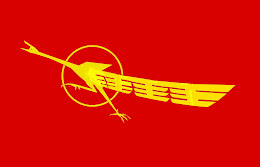





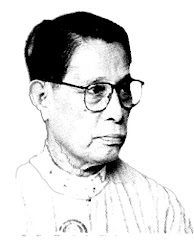



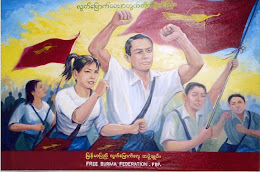





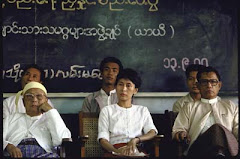

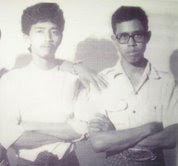

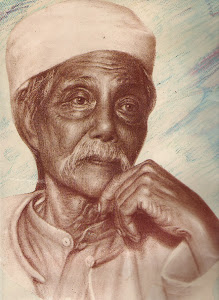
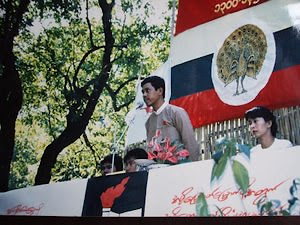
No comments :
Post a Comment